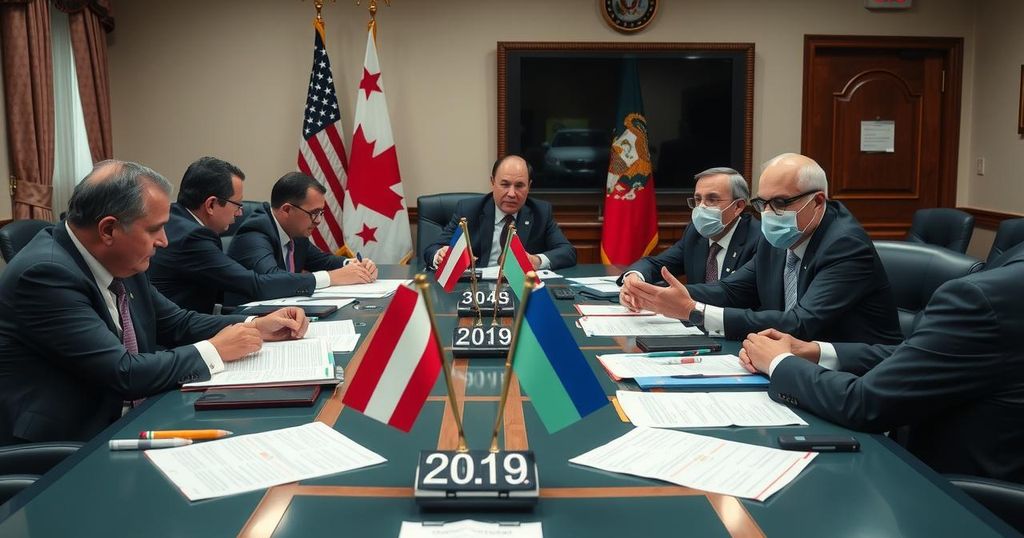Global news
AMERICA, ASIA, BIDEN, BIDEN ADMINISTRATION, CHINA, DEFENSE, DIPLOMACY, DONALD TRUMP, EUROPE, EUROPE/ASIA, GEOPOLITICS, IRAN, JOE BIDEN, KURSK, MEXICO, MILITARY COOPERATION, MOSCOW, NORTH AMERICA, NORTH KOREA, RUSSIA, STRATEGIC PARTNERSHIP, TEHRAN, TRUMP, U. S, UKRAINE, UNITED STATES, WASHINGTON, WHITE HOUSE
Fatima Khan
0 Comments
Biden Approves National Security Memorandum in Anticipation of Trump’s Return
President Biden has approved a national security memorandum designed to guide the incoming Trump administration in countering the growing alliance among China, Iran, North Korea, and Russia. The classified memo outlines critical recommendations, including improving interagency cooperation and enhancing information sharing with allies, reflecting a strategic necessity to address the complexities of U.S. foreign relations.
In preparation for Donald Trump’s anticipated return to the presidency, President Joe Biden has endorsed a new national security memorandum aimed at addressing the increasing collaboration among China, Iran, North Korea, and Russia. This strategic document, developed over the summer, is intended to serve as a guide for the incoming administration, enhancing its policy responses from the outset regarding the evolving relationships among these adversarial nations. The White House has chosen to keep the specifics of this classified memo confidential due to the sensitivity of its revelations.
The memorandum delineates four overarching recommendations: first, enhancing interagency cooperation within the U.S. government; second, accelerating the sharing of intelligence with allies concerning these adversaries; third, adjusting the use of sanctions and economic measures for optimal effectiveness; and finally, fortifying preparedness against the possibility of concurrent crises stemming from these nations. For years, the United States has expressed concern regarding the growing ties among these countries, a trend that has intensified since Russia’s incursion into Ukraine in 2022.
As Russia finds itself increasingly isolated on the global stage, its alliances have strengthened, particularly with Iran and North Korea, with significant arms exchanges and mutual support. This collaboration includes Iran supplying drones and missiles to Russia and receiving military assistance in return, such as fighter jets. Additionally, North Korea has benefited from Russian fuel and financial aid, bolstering its military capabilities. Notably, both China and Russia are enhancing their military cooperation, including joint Arctic military exercises.
Despite the markedly different foreign policies espoused by President Biden and former President Trump, officials from both administrations have worked to ensure coordination on national security strategies during this transitional period. A senior official from the Biden administration remarked that the memorandum is not intended to constrain the Trump administration’s policy options but rather to provide a framework for building strategies concerning these complex international relations.
The national security memorandum stems from heightened concerns regarding the collaborative behaviors of China, Iran, North Korea, and Russia, particularly in light of Russia’s isolation following its invasion of Ukraine. The Biden administration has recognized a significant shift in these nations’ dynamics, prompting a need for a well-defined strategy to counter the collective actions and potential threats posed by these adversaries. The initiative reflects the urgency to adapt U.S. foreign policy to the realities of a changing geopolitical landscape marked by increased cooperation among hostile nations.
In conclusion, President Biden’s national security memorandum serves as a crucial tool for the incoming administration, providing guidance on addressing the intensified collaboration among key adversaries. The focus on interagency cooperation, enhanced intelligence sharing, effective sanctions, and crisis preparedness underscores the necessity of a cohesive approach to foreign policy. As the landscape shifts, it remains essential for U.S. leadership to adapt strategies proactively, ensuring national security amidst evolving international challenges.
Original Source: www.pbs.org




Post Comment